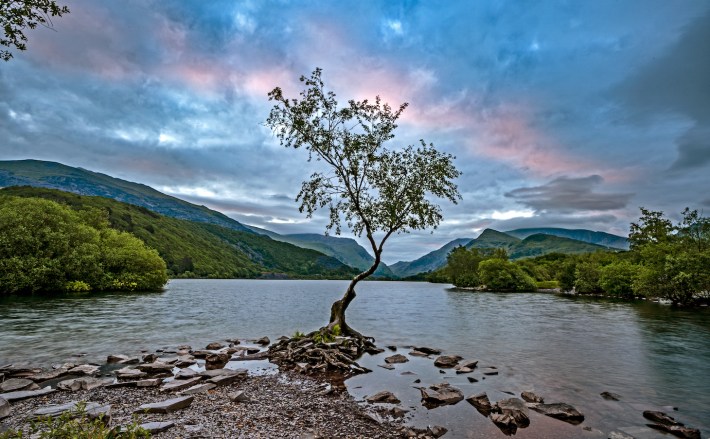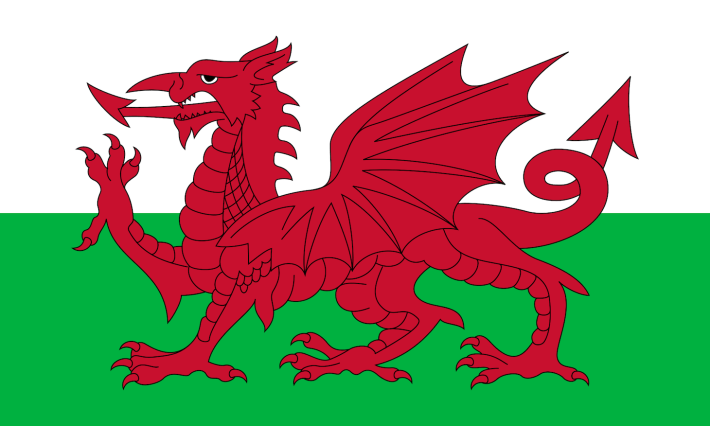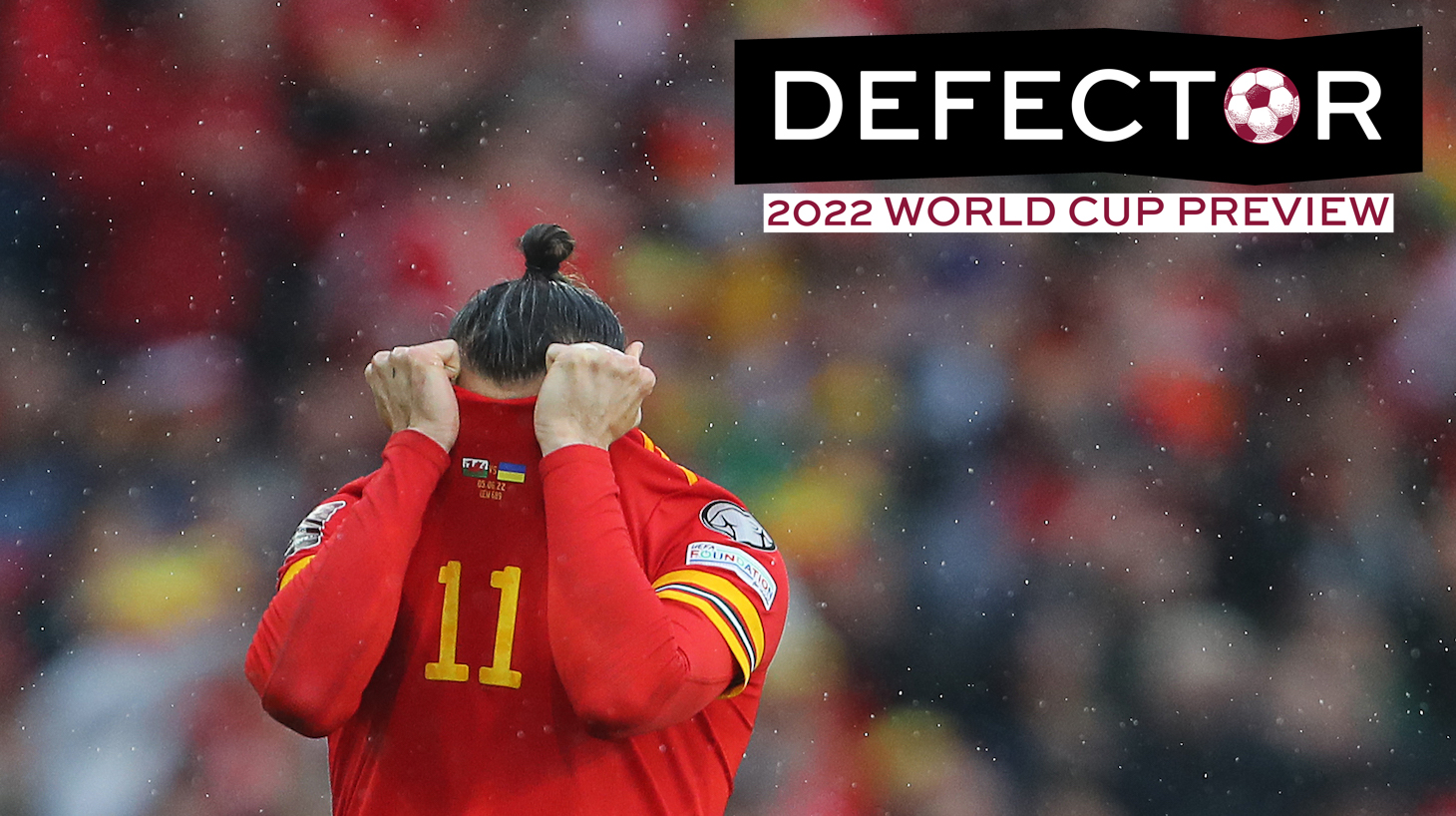It’s almost time for the 2022 World Cup. To help get you ready, we will be providing you with precious information about every team in the tournament. You can read all of our World Cup previews here.
Boiling down an entire team's fortunes, hopes, and story to a single player is generally something to be wary of. A team is greater than an individual, and especially in a collective sport like soccer, not even the best player in the world can do it all by himself. But if ever there were an example of when it is appropriate to reduce a team to just one player, it would be with Wales and Gareth Bale.
In a significant way, Wales is what Gareth Bale has made it. The tiny British country has qualified for just four major tournaments in its long but unremarkable history. Three of those successful qualification campaigns were led by Bale. The acme of Welsh soccer was the team's semifinal run in the 2016 Euros, which was achieved in large part due to Bale's scintillating performances there. He is his country's all-time leading scorer, and will most likely become its all-time appearances leader at this World Cup. Bale is not only the greatest Welsh soccer player in history, he is probably the greatest Welsh athlete in history. The tournament will almost certainly be the last of his international career and possibly of his entire playing career, if the rumors that he plans to retire from the sport after the World Cup prove true. On soccer's biggest stage, one Wales has stepped on only one other time, the country will place its hopes in and say goodbye to its biggest icon. So in this particular instance, it is largely true that Wales is Bale and Bale is Wales.
Freighted with so much weight and importance, does Wales have what it takes to make its second-ever World Cup a special one? And, realistically, what would count as special anyway? The answers to those questions are less clear. Bale is still Wales's best and most important player, but he's also 33 years old, has already taken the first steps toward retirement by joining MLS, and isn't even getting much playing time there in spite of being healthy. For the past few years Bale has demonstrated the ability to turn his talent on like a light switch, to go from not playing at all at club level to playing and at his best with Wales. But the erosion of his skills after all the years and injuries and lack of playing time are also unmistakable. This Bale is not the Bale of 2016, and the Wales team surrounding him doesn't look capable of making up the difference.
All of that makes Wales hard to read coming into the tournament. If Bale can maximize what's left of his abilities, there's no reason why Wales couldn't make it out of the toughest group in Qatar and cause some trouble in the knockout rounds. But if Bale's age and lack of sharpness make themselves evident, and his largely solid but unexceptional teammates don't have the tournaments of their lives, then it wouldn't be at all surprising to see Wales finish last in the group.
Luckily for Welsh fans, simply reaching the tournament is itself reason enough to celebrate. It's been 64 years since the Dragons have played in the World Cup, and the mere fact that Bale has brought the country this prize, the last one in his illustrious career, should make the experience a memorable one. And who knows, maybe Bale has one final trick up his sleeve, and maybe the best of Wales and of Bale's career really is yet to come.
Who Is Their Main Guy?
Jonny Williams is a 29-year-old midfielder who currently plays for Swindon Tow—I'm kidding. Obviously it's Gareth Bale. As mentioned earlier, Bale in 2022 is simultaneously a known quantity and an enigma. You know what you're getting when he's on his game: long, powerful sprints down the pitch, a bomb detonator of a left foot, and lots of goals coming off either his left foot or his man-bunned head. What you get from him today is more or less what you've always got from him, just with probably a little less power, length, and frequency of those runs, which leads to fewer goals. Here's what the Bale thing looked like at its peak, as displayed during that crowning Euro 2016 tournament of his:
A lot has changed since 2016. Today's Bale has three more Champions League titles to his name, three more La Liga trophies, and several years of almost unrelenting pain. Physical pain, in the form of the agonizingly persistent leg injuries that robbed his once unstoppable-seeming career of every bit of its momentum at every turn. And also, presumably, emotional pain, as the game that must have given him such joy and purpose became a source of, more than anything, emptiness.
It's pretty bizarre how Bale's Real Madrid tenure turned out. Though it's widely seen as an unmitigated failure now, for a good while there Bale was everything Real must've expected when signing him. For the majority of his first five seasons at the club, Bale was one of the very best attackers in the world. He ran and he scored and he won, playing a critical role in Madrid's legendary stretch of Champions League supremacy. But even in the good years, Bale's injuries obstructed his path. He would have a good run of form, get hurt at the peak of it, miss a few weeks, come back, work himself in to shape, have a good run of form, and then get hurt again.
At a tippity-top club like Real Madrid, even the best players in the world only get but so many chances to show up and perform before getting replaced. Bale's lack of dependable health meant Madrid had to learn to play and win without him. With the roster's ridiculous depth, the team did just that, and found that it needn't rely so much on its oft-injured superstar. Thus even during his fitful spells of good health, Bale had a hard time getting onto the pitch and retaining his status as a foundational piece in the club's present and future.
But while the injuries are a big part of the story, they aren't all of it. The injuries do not explain why Bale reportedly had a difficult time integrating himself socially with his teammates, to the point where he was seen as a loner amidst an otherwise tight-knit group of players, or why a famously congenial player's manager like Zinedine Zidane felt so strongly about his desire to get rid of Bale that he at one point up and quit his job in part because the club failed to oust the Welshman. Injuries can explain why Bale lost his place in the team, and how demoralizing it must've felt to no longer be able to consistently do the thing you once did better than almost anyone in the world, but they cannot fully explain how a meticulous, motivated, and undistracted player—Bale, it's worth remembering, is a teetotaler who has been with his now-wife since the two were in high school, and is well-known for how intensely he maintains his chiseled physique—seemingly lost all his ambition, enthusiasm, and drive.
Bale's last couple years in Madrid were marked by a strange disinterestedness in his play, a total disconnection between himself and his team, and his unwillingness to leave what was clearly a toxic environment and find a new place to ply his trade and hopefully regain his athletic happiness. Getting hurt so often and the myriad ramifications that radiated from those injuries are surely the main forces behind everything that happened in Madrid. But even more than the infuriating unreliability of his body, it had to have been the emotional damage of the experience that really proved determinative. And that damage has left him with a tattered reputation, a prematurely truncated prime, and a roster spot on an MLS team that barely even uses him. It's not exactly where you would've imagined he'd be back in 2016.
For all the struggles of his club career, playing with the national team has always been Bale's happy place. With Wales Bale has an indisputable place at the top of the hierarchy, a group of players he's formed close bonds with over more than a decade of teamwork and friendship, and the unreserved, unconditional love of the Welsh fans. I believe that the security, camaraderie, and love Bale receives when playing for Wales is what heals the emotional scars of his Real Madrid tenure—where he was never loved or even really understood by a demanding fanbase that saw him at best as an accessory to success and at worst an active impediment to it—and makes him capable of performing at a level you'd assume was no longer available to him whenever he pulls on the Wales jersey.
In Qatar, Bale will once again be showered with that rejuvenating security, camaraderie, and love. We'll see what it does for his level at this final stage of his career when he gets there.
Who Is Their Main Non-Scoring Guy?
Jonny Williams is a 29-year-old midfielder who currently plays for Swindon Tow—kidding again! A more traditional (and probably more strictly informative) Wales World Cup preview would probably tell you about Aaron Ramsey right now, who has long served as Bale's trusty right-hand man as the two led Wales to glory. But Ramsey is primarily a goal-scoring midfielder, and because we've elected to do one section about a scorer and one section about a non-scorer, I must unfortunately sidestep the second-best Welshman of his generation. But the show must go on, so...
Joe Allen is a 32-year-old (wow, only 32!) midfielder who currently plays for Swansea City in England's second division. Once unforgettably dubbed "the Welsh Xavi" for his voluminous passing acumen, Allen in his later years has been most valuable for his defensive contributions. Especially in Wales's weak midfield corps, Allen is a crucial player in the middle of the park to shield the defensive line with his coverage and tackling while also sparking attacking transitions with his passes. The following highlight video is old and not particularly instructive, but seeing a compilation of such a safe and sober player like Allen soundtracked by one of those apocalyptically bombastic dubstep songs is too funny not to share:
Allen has been injured for a couple months, but Wales is hopeful he'll recover right as the World Cup is about to start. They'll need him.
Where's The Beef?
Which teams or players does Wales not like? Do Wales's players like each other? We investigate Wales's potential enemies.
Wales is a little like Ecuador in that it has such a tiny footprint in international soccer that the national team hasn't really done much stepping on toes to earn any ire. That doesn't mean there won't be any clubs in Qatar that Wales will be looking forward to duking it out with. Thankfully, the juiciest scalp Wales could claim will meet them right there in the group stage.
Wales and England aren't really soccer rivals in any significant sense. England, naturally, is a zillion times bigger and more successful in the sport than Wales, so it's not like the two compete as anything close to peers. (This isn't the case in other sports. In rugby, Wales's favorite sport, the Wales–England rivalry is huge.) That said, there is history there. Wales and England have competed against each other 102 times over the years. In addition, England and Wales memorably met just six years ago in the group stage at Euro 2016. England won the battle but lost the war; though the Three Lions slayed the Dragons in the head-to-head match thanks to a stoppage-time winner from Daniel Sturridge, Wales still topped the group and made it to the semis, while England was upset by Iceland in the round of 16.
England welcomed Wales to the tournament at the latter's inaugural European Championship, and will do so again at its second World Cup. In Qatar, Welsh fans would probably be wise not to aim much higher than qualifying for the knockout round and playing a respectable game there. A good result against England in the final group stage match could go a long way toward realizing that goal, and even if Wales can't make it out of the group, they could still get one over on their national overlords by taking points off England. It doesn't look to be the most contentious match of the tournament, but there should still be passion and drama to it.
Most Likely To Go David Ospina Or James Rodríguez Mode
Who is Wales's best candidate for a breakout performance that earns them a career-changing transfer? Might this potential post-tournament transfer go well, like when Colombia's James Rodríguez went to Real Madrid after starring in the 2014 World Cup? Or could it go poorly, like when Colombia's David Ospina went to Arsenal after starring in the 2014 World Cup?
Should he complete it, Neco Williams's journey to the top will be a return, not an arrival. The 21-year-old came up through the Liverpool academy as one of its most promising fullback talents. He broke into the first team as a teenager and immediately impressed, primarily thanks to his attacking verve. He's an incredibly direct player who tries to carry or pass the ball forward the instant he receives it. He also has ridiculous energy reserves that allow him to bomb up and down the pitch over and over again without tiring. He's a nifty dribbler, can play a nice final ball once he gets into good position, and he's versatile, playing well on his natural right side as well as on the left.
All of those skills in such a young player are what earned him 33 appearances across all competitions for one of the best teams in the world, playing behind one of the best right backs in the world, and they are also why he ultimately decided to leave Liverpool, first on loan to Fulham last January and then through a permanent sale to Nottingham Forest this past summer.
Fighting for and winning the odd start as a young player at a huge club is all well and good, but there's no substitute for a steady, regular diet of minutes. Williams knew that at Liverpool he wasn't going to get the kind of playing time he'd need if he wanted to continue growing at the rate he had been, so he moved to Nottingham Forest. Jürgen Klopp, a big believer in Williams's talent, said, "It’s not easy to let him leave if I’m being honest" after the transfer went through, but admitted that Williams "deserves to be playing regularly and he’s earned the right to be ready for his international team for this tournament coming in the winter." Williams has already played twice as many Premier League minutes this season as he did in all two-and-a-half seasons he spent with Liverpool's first team.
Williams is a major part of Wales's offense. Together with Dan James, the indefatigable duo provides much of the defense-warping verticality and pace Wales relies on in attack. Forest has struggled this season, but Williams has played a lot and played pretty well despite it. That experience and match-sharpness should prepare him well for the World Cup. With a big showing there, plus a strong finish to the Premier League season, Williams probably won't be too far for another transfer, this time somewhere closer to the level he came from.
Fun Geographical Fact
Wales is primarily mountainous, which makes it very pretty. See?

All those mountains made Wales prime mining territory. At various points in the past, the country was one of the largest exporters of slate in the world. The Penrhyn and Dinorwic quarries were in their heyday the two biggest slate quarries on Earth. Here's a cute old-timey video of the Dinorwic quarry in action:
Good Flag Or Bad Flag?

Gotta be the best flag in the tournament. The only better flag I can think of is this Welsh flag with a couple choice additions:

Good Anthem Or Bad Anthem?
Do you really think "The Land of Song" would have anything other than a kickass anthem?
Notable Moment In World Cup History
Though Wales has only appeared in one World Cup before this one, their first happened to be a memorable one. In the 1958 World Cup, hosted by Sweden, the Dragons were able to eke their way out of the group stage with three draws, after which they were paired with Brazil in the quarterfinals. That match was a hard-fought one ultimately decided when a then-unknown Brazilian teenager scored a banger of a goal in the 66th minute. That teenager's name was Pelé, and that goal was the first of his career in the World Cup. As you well know, it was not his last.
How Can They Win The World Cup?
Gareth Bale is one of the best and most decorated players of his generation, who nevertheless has had a somewhat star-crossed career. But what if this strange, star-crossed aspect was no mere coincidence? What if a teenaged Bale, at that point just a left-back prospect at Southampton, yearned so dearly for a successful career that he was willing to do anything for it? What if, in a Twilight Zone–esque turn of events, the Devil herself appeared to this teenaged Bale, and promised him a career worthy of legend, full of money and trophies and goals, which would be capped by a World Cup victory for little old Wales?
What if Bale, saucer-eyed but still doubting, didn't believe this were possible—Wales? World Cup champions? No freaking way!—so the Devil magicked the two of them to Lusail, Qatar in the winter of 2022, onto the pitch in the just-concluded World Cup final, and as confetti rained from the skies, the apparitional Bale from the past saw the Bale of the future, trophy in hand, weeping with joy? What if in a fit of crazed excitement, Bale exclaimed that he now trusted what this strange woman had shown him, and that he would be willing to make any trade with her that would make this future his own? What if the Devil replied that realizing this dream would cost him his immortal soul? What if Bale was so enthralled and eager that he immediately agreed, and the fateful bargain was struck?
But what if the Devil, notorious trickster she is, didn't explain what this future looked like to any real specificity? What if she blessed him with his outstanding Tottenham and early Real Madrid years, but then began to curse him with the injuries, the social alienation, the lack of playing time, and the soiled reputation, all the while technically complying with the terms of the bargain by gifting Real Madrid with title after title? What if this realization that he'd been had finally hit Bale somewhere around his sixth year in Madrid, and his resignation to his fate was a response to just that—his awareness that the die had been cast and resistance was futile? What if the only thing keeping Bale in the sport was the promise of that final reward that had so tantalized him all those years ago, the vow that if he could just hang on long enough, he would eventually bring Wales a literally unbelievable World Cup title in 2022?
If all of that happens to be the truth, then Wales is definitely going to win the whole thing in Qatar. If not, they've got no chance.






